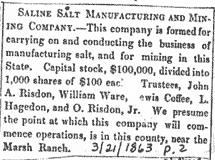 1863 Salt Mines
1863 Salt MinesThe Risdon and Mead Family
Existence of salt springs was common knowledge to people living throughout the San Francisco, the Delta, and San Joaquin region. The West was filling with settlers from the East. California joined the United States in 1850. Easy gold rush wealth picked from placer claims was coming to an end by 1860 and industrial development was escalating. Original Californio’s, including John Marsh, were desperate to secure their extensive Mexican land holdings under U.S. real estate law. Marsh was partially successful in confirming his land grant but his claim was not confirmed as far as the San Joaquin river. His property line stopped east of the Salt Springs allowing others to claim the Springs as their own.
John Risdon of Saline, Michigan was just such a man. Risdon had come to San Francisco and established himself in iron manufacturing. Risdon and his partners William Ware and James Coffey were involved in a succession of iron and boiler works, most notably the Risdon Iron Works. Risdon’s younger brother, Orange Risdon, Jr. joined the business in California as boilermaker and bookkeeper for the firm. The iron manufacturing business was exceedingly successful holding patents for the first river mining dredge, producing iron pipe for transporting water to San Francisco from the Crystal Springs Reservoir, and providing the iron infrastructure for the burgeoning Virginia City Comstock mines. The Risdon’s had the capital, skill, and knowledge to seek salt manufacturing opportunities.
Their father, Orange Risdon, Sr., founded the City of Saline, Michigan, and named it for the region’s mineral salt resources. The senior Risdon, a surveyor and land speculator by trade, had successfully exploited the mineral wealth of the region. It was no coincidence that, James Risdon and brother, Orange Risdon, Jr. sought commercial salt manufacturing opportunities in California. The Risdon brothers with business partners James Coffey and William Ware surveyed the Hot Springs property, improved it by constructing four small buildings, and filed a land patent for 160 acres (four parcels of 40 acres each) with the salt springs in the center.
Orange Risdon, Jr., a single man, filed the appropriate forms and attestations with the United States Land Office, Martinez, using a military land warrant drawn in favor of Esteban Mansanares, a private with the New Mexico Volunteers during the Mexican American War. Land warrants were a common method of paying military volunteers of the time. Mansanares received his warrant good for 160 acres based on 16 days volunteer enlistment and engagement in skirmishes with the Apache Indians along the New Mexico/Mexican boarder. Land warrants traded easily and were often sold by the enlistees at a significant discount. This particular land warrant had found its way into the office desk drawer of the Risdon Iron Works. We do not know how. We do know that Orange, Jr. used it as the basis of the patent application for the 160 in his name only unbeknown to the other participants.
[next] [back to the top] [2] [3]
Home l Resort Plans l History l Golf Course l Resort Store l Newsroom l Contact Us
© 2004 Byron Hot Springs